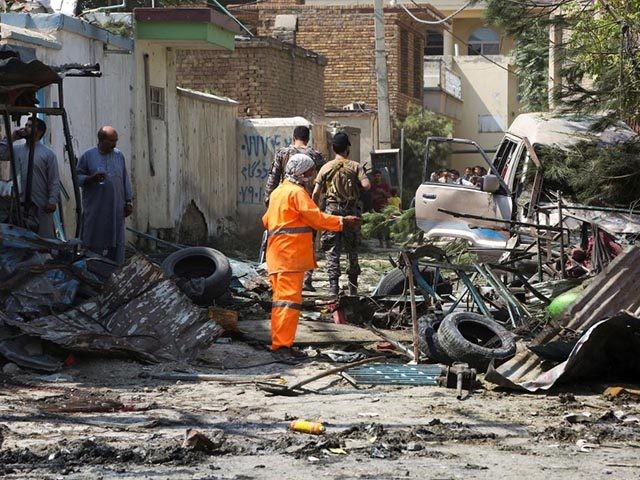The office of the Special Inspector General for Afghanistan Reconstruction (SIGAR), a government watchdog agency, revealed in a report published Tuesday that American taxpayers lost about $19 billion to “waste, fraud, and abuse” in Afghanistan in the past decade.
John Sopko, who holds the SIGAR title, said in the report that his office had documented several outrageous instances of misspent American money in the period covering May 2009 to December 2019, including the construction of a soccer stadium not built to regulation — rendering it useless — later improperly used as a military training site and the construction of staircases to nowhere in single-floor developments.
A significant percentage of the waste identified — $12 billion — went to “counter-narcotics” programs in the country that Sopko deemed wasteful because “the programs did not achieve their intended purpose.” The Taliban jihadist group — which ran the country prior to the American invasion in the aftermath of the September 11, 2001, al-Qaeda attacks — generates a significant portion of its funding from growing poppy, an opium crop used to make a variety of opiates including heroin and fentanyl. According to the United Nations, Afghanistan produced 82 percent of the world’s opium in 2018. Record-high cultivation dipped in the face of extensive droughts — not counter-narcotics efforts — but appears poised to rise as desperate farmers look for ways to survive the global economic crash caused by the Chinese coronavirus pandemic.
The SIGAR report noted that this misspent money may be only a fraction of what American taxpayers have lost in the country, as the agency has reviewed less than half of the $134 billion that Congress has appropriated for Afghanistan reconstruction efforts since 2002. Of the sum reviewed, about 30 percent was lost to waste, fraud, and abuse, including corruption and incompetence.
A significant majority of the documented instances of failed spending SIGAR identified, about 90 percent of the 323 instances in the report, were identified as “waste,” defined by the Government Accountability Office (GAO) as “the act of using or expending resources carelessly, extravagantly, or to no purpose.”
“These instances included programs and projects that lacked clear program goals, performance measures, and quality data to support management decisions, as well as assets that were not used, abandoned, or posed safety hazards,” the report noted.
Among the largest wasteful projects identified was an incorrectly-constructed sports stadium.
“In Kunduz province, we found that a sports stadium, which was built for community use, was not being used. According to the facility director we met with, the stadium field had not been used because it was not designed correctly to host football (soccer) games and did not have a functioning irrigation system,” SIGAR explained. “SIGAR found that the facility and grounds suffered damage because the Afghan National Directorate of Security (NDS) used the stadium as a base for military operations during a heavy period of fighting against Taliban forces from April to June 2017.”
A significant portion of the wasted money went to project like this — infrastructure construction that lacked oversight to ensure that it was built properly and was thus useless. In another instance, contractors were paid to build “staircases leading to the ceilings — not the roofs — of single-story buildings.”
While most of the waste went to incompetence, some went to crime:
An Afghan subject stole a firetruck and a pick-up truck from a U.S. military base and sold them. The combined value of the vehicles was $801,071.
[…]
In another instance, SIGAR investigators found that individuals were fraudulently selling U.S. Embassy Kabul meal cards. Through their investigation, our investigators found that the theft had been going on for 5 years, and the Department of State lost between $50,000 and $80,000 monthly for total of a $3 million loss.
SIGAR recommended American officials dedicate more time to ensuring that money goes to initiatives not suffering from “a lack of clear program goals, performance measures, or quality data to support managerial decisions and ineffective monitoring or oversight of program activities and reconstruction dollars.”
The report arrives as the administration of President Donald Trump continues talks with the Taliban and the legitimate government of Afghanistan to negotiate a safe exit for the United States, which has been involved in the country militarily for 19 years. Secretary of State Mike Pompeo attended the launch of talks between the two sides in Doha, Qatar, in September, seeking an agreement from the Taliban that it would not target U.S. troops for attack or harbor international terrorists groups that could do damage to American interests. In exchange, America would agree to withdraw from the country.
The Taliban has dramatically reduced attacks on American troops, though it has increased attacks on Afghan forces, since the talks began. During the launch of talks in Doha, Taliban negotiators demanded the establishment of a Sharia-based legal system in Afghanistan — which is already legally an Islamic republic — and the freedom of all imprisoned Taliban jihadis, estimated to number in the thousands.
“(We want) a government in which the Holy Quran is ruling, the hadith of the messenger (Muhammad) is ruling, the Hanafi school is there, and the occupation is over,” Mawlawi Abdul Kabir, a member of the Taliban negotiation team, said during the talks.
The Taliban considers itself the only legitimate government of Afghanistan, referring to the country as the “Islamic Emirate.”

COMMENTS
Please let us know if you're having issues with commenting.